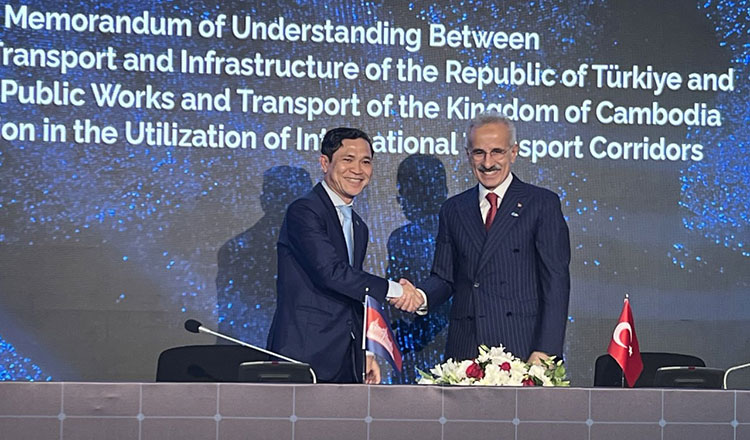
Turkiye’s strategic geographic position is expected to offer Cambodia an alternative gateway for exporting goods to European markets.
The Ministry of Public Works and Transport (MPWT) and Turkiye’s Ministry of Transport and Infrastructure signed an MoU to enhance cooperation under the Central Corridor and TRACECA, aiming to boost connectivity, attract investments and strengthen the role in linking ASEAN to the Asia-Europe transport and trade network.
The MoU was signed by Leng Thunyuthea, Secretary of State of MPWT and Abdulkadir Uraloglu, Minister of Transport and Infrastructure of Turkiye, on the sidelines of the “Global Transport Connectivity Forum” themed Seamless Connectivity, Limitless Possibilities, in Istanbul, on Sunday.
According to an MPWT announcement on Monday, the draft agreement paves the way for formal cooperation on international corridors, aiming to promote cross-border transport links via the Central Corridor and TRACECA – an international transport programme involving the EU and 12 member states of the Eastern European, Caucasus and Central Asian region.
The initiative is expected to deepen bilateral cooperation, enable Cambodia to integrate further into the Asia-Europe supply chain, and support its ambition to become a competitive logistics and investment hub within ASEAN with direct connections to European markets.
Leading the delegation to participate in the Global Transport Connectivity Forum under the chairmanship of Recep Tayyip Erdogan, President of Turkiye, the MPWT Secretary focused on boosting international trade, logistics and investment through improved transport links.
The forum was attended by ministers and deputy ministers from around 60 countries, along with leaders of global institutions, academics, and over 4,000 private sector stakeholders exploring new trade corridors.
The event addressed key challenges disrupting connectivity and supply chains between Asia and Europe, such as geopolitical rivalries and climate change.
Participants jointly reaffirmed their commitment to unlocking the economic potential of the Central Transport Corridor and TRACECA, positioning them as emerging trade routes that support peace, prosperity and public-private partnerships across Eurasia.
Discussions emphasised not only physical infrastructure upgrades but also strategies to make these corridors more competitive and investment-ready by focusing on sustainability, digital transformation and innovative financing.
Participants highlighted the use of artificial intelligence, smart logistics, and green technology to enhance corridor efficiency and attract capital.
The MPWT Secretary also joined as a speaker in the session “The Evolving Geometry of the Middle Corridor: New Gateways, New Possibilities”, where he underscored Cambodia’s potential to serve as a dynamic entry point into the ASEAN market.
Thunyuthea emphasised that the Middle Corridor, if effectively connected with ASEAN—particularly Cambodia—can significantly enhance regional investment flows due to Cambodia’s political stability, infrastructure development and pro-business policies.
He also shared Cambodia’s infrastructure strategies, which prioritise sustainable connectivity and resilience, and highlighted recent achievements in the transport sector under the leadership of the Royal Government.
Speaking to Khmer Times, Hong Vanak, an economic researcher at the Royal Academy of Cambodia, said that Turkiye exports a diverse range of goods to Cambodia, including key categories such as textiles and clothing, machinery and equipment, pharmaceuticals, cereal products and chemicals.
“More specifically, high-value exports often feature heavy pure woven cotton, packaged medicaments and other synthetic fabrics,” he said.
He continued that Cambodia primarily exports a range of goods to Turkiye, including textiles, bicycles, agricultural products like mangoes, longan, rubber, cassava, corn, pepper and rice, as well as products like organic chemicals and tobacco.
Vanak said, “Although Turkiye is not a member of the European Union, its strategic geographic position offers Cambodia an alternative gateway for exporting goods to European markets.”
Source: Khmer Times
Share: